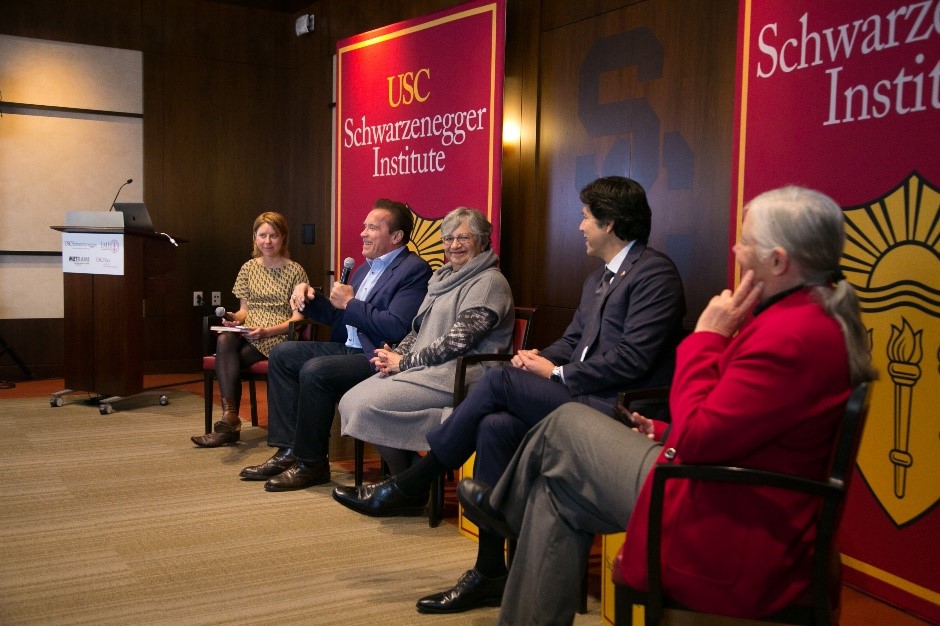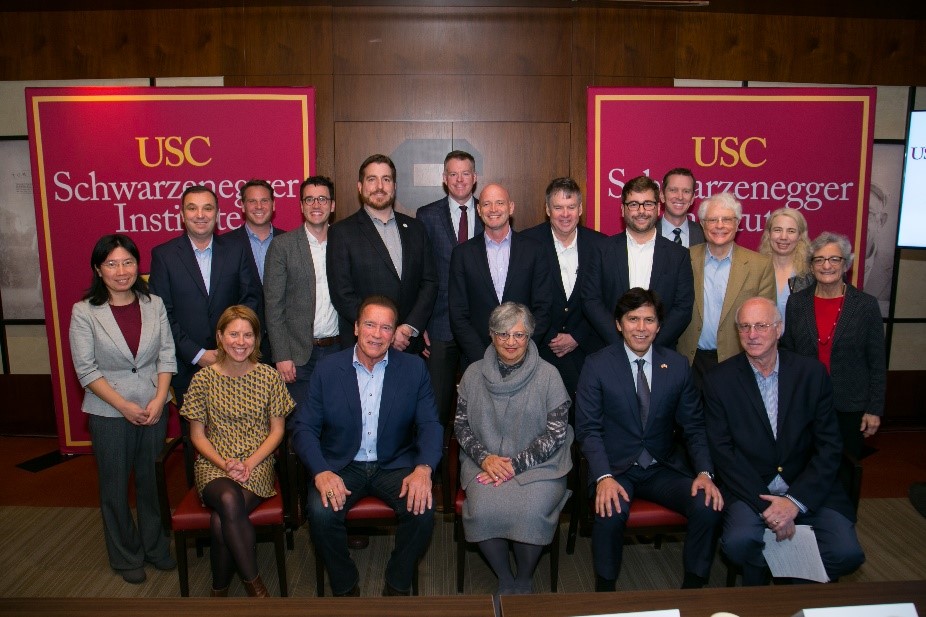Transportation is still the largest source of greenhouse gas emissions in California. The USC Schwarzenegger Institute brought together key researchers, policymakers and regulators from within the state to explore ways to curb the growth of these emissions in a cost-effective and equitable manner.
The Schwarzenegger Institute collaborated with Stanford University’s Energy Modeling Forum, the USC Price Center for Sustainability Solutions, and METRANS Transportation Center to host a Symposium on Climate Change Policy and Transportation on Nov. 20.
Researchers making presentations included Antonio Bento (USC-Price), J.R. DeShazo (UCLA), Genevieve Giuliano (USC-Price), Geoff Blandford (EPRI), Colin Murphy (UC, Davis) and Ross Brown (LAO). Lunch speaker Elizabeth Scheele, Research Division Chief at the California Air Resources Board (CARB), presented an overview of research in her agency.
The event was mainly focused on research but also included a bipartisan panel of lawmakers and regulators who helped pass and enforce California’s environmental policy. Former California Governor Arnold Schwarzenegger participated in this panel discussion with California Air Resources Board Chair Mary Nichols, former Senator Kevin de Leon and former Senator Fran Pavley.
Former CA state senator Fran Pavley, now environmental policy director for the Schwarzenegger Institute, authored California’s landmark Global Warming Solutions Act (AB32) and California Clean Cars Campaign that required a reduction in greenhouse gas emissions from vehicle tailpipes.
She said it was growing up in Los Angeles in the late 1950s and early 1960s when kids weren’t allowed to go out for recess some days because the air quality was so bad that sparked her to take action.
Kevin de Leon, former president pro tempore of the CA senate, stressed how pollution affects people of color as one of the reasons he supported environmental legislation.
“In disadvantaged communities up and down the state of California, they bear the brunt of greenhouse gas impacts as well as the other pollutants that they breathe into their lungs every single day,” de Leon said.
Schwarzenegger asserted that there has been a tremendous failure worldwide with 70% of countries not complying with their own goals for greenhouse gas reductions set in the Paris Climate Agreement of 2015.
“My concern then, and still today, was do they have an air resources board?” Schwarzenegger said of those countries. “Because if you don’t, then you will not go and make this vision of yours a reality. Politicians talk a big game a lot of the time, not just here in America but worldwide. … You’ve got to have someone who says, ‘OK, you’ve just promised 15%, now let’s figure out how do we get there.’ It’s all about execution.”
In California, Schwarzenegger appointed Mary Nichols as chair of the California Resources Board to execute the state’s reduction goals.
Nichols declared that California’s Cap-and-Trade Program has been key to keeping the business community on board.
“Yes, we can have strong environmental rules and a good economy,” Nichols said. “Even Republicans mostly say that now. We have to get to the point where we can tease out how exactly good environment and energy policies benefit the economy. I’m happy to keep helping to generate statistics about … how our economy has prospered at the same time as we were doing all these progressive things on climate.”
When oil companies tried to undo all of California’s environmental laws during the recession in 2010, Schwarzenegger contended that it wasn’t until opponents started talking about the negative health effects of pollution that the tide turned to defeat the proposition.
He urged the people in the room to find a way to communicate about the necessity to reduce pollution in ways ordinary people can understand.
USC Price Prof. Antonio Bento, of the USC Price Center for Sustainability Solutions, went over what was wrong in the Trump administration’s rollback analysis.
In correcting major modeling flaws related to projecting an incorrect fleet size by not taking into account an increase in used car prices, Bento finds that there is no valid economic reason to justify the proposed rollback.
Other topics discussed by academics and environmentalists at the symposium included electrifying heavy-duty vehicles, the decarbonization of transport in California, the next decade of sustainable transportation policy and the effects of California’s climate policies.
John Weyant, co-director of the Stanford EMF, who co-organized the Symposium with Price Research Prof. Adam Rose, stated: “The symposium provided an outstanding opportunity for multi-institution brainstorming about the types of analyses that would be most helpful to those responsible for designing and implementing California climate policies. The four individuals most responsible for the development of California policy provided inspiration and direction for technical discussions amongst a number of the state’s top policy analysts.”
Rose added: “The interaction among participants from both Northern and Southern California was valuable given the different backgrounds and perspectives from these two regions, which must work together to be successful in making policy advances to tackle climate change.”
Conyers Davis, Global Director of the Schwarzenegger Institute, said, “Governor Schwarzenegger set up this Institute to promote the best ideas irrespective of ideology or school affiliation. It was exciting bringing the best and brightest minds in California together for the climate change and transportation symposium, and I am confident that by working together we can find cost-effective and equitable ways to reduce the greenhouse gas emission generated by the transportation sector.
Story By Matthew Kredell


